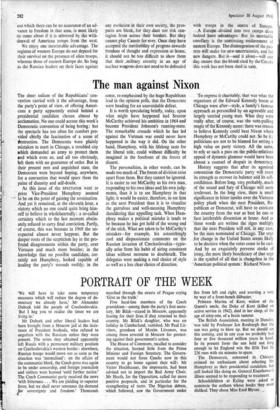PORTRAIT OF THE WEEK
We will have to take some temporary measures which will reduce the degree of de- mocracy we already have,' Mr Alexander Dubcek told the people of Czechoslovakia. `But I beg you to realise the times we are living in.'
Mr Dubcek and other liberal leaders had been brought from a Moscow jail, at the insis- tence of President Svoboda, who refused to negotiate with the Russians unless they were present. The terms they obtained apparently left Russia with a permanent military position on Czechoslovakia's western border : elsewhere, Russian troops would move out as soon as the situation was 'normalised': on the affairs of the communist block, the Czech press was again to be under censorship, and foreign journalists and visitors were banned 'until further notice.' The Czech Communist party received the news 'with bitterness . . . We are yielding to superior force, but we shall never renounce the demand Jor sovereignty and freedom.' Thousands marched through the streets of Prague crying `Give us the truth.'
Five hard-line members of the Czech praesidium—among them the party's first secre- tary, Mr Bilak—stayed in Moscow, apparently fearing for their lives if they returned to their country. Mr Bilak's daughter, who was on holiday in Cumberland, vanished. Mr Paul Lit- vihov, grandson of Maxim Litvonov, was among those arrested in Moscow for protest- ing against their government's action.
The House of Commons, recalled to consider the situation, learned little from the Prime Minister and Foreign Secretary. The Govern- ment would not force Czechs now in this country to go home against their will: Mr Victor Hochhauser, the impresario, had been advised not to import the Red Army Choir. Mr Heath, for the Opposition, called for more positive proposals, and in particular for the strengthening of NATO. The Nigerian debate, -which followed, saw the Government under fire from left and right, and averting a vote by way of a front-bench filibuster. Princess Marina of Kent, widow of the Queen's uncle, the Duke of Kent (killed on active service in 1942), died in her sleep, at the age of sixty-one, of a brain tumour. The British Association, meeting in Dundee, 'Vas told by Professor Ian Roxburgh that the sun was going to blow up. But we should see this coming, and in any case we probably had four or five thousand million years in hand. In its present form the sun held out long enough to let England win the fifth Test by 226 runs with six minutes to spare. The Democrats, convened in Chicago, evinced no enthusiasm about selecting Mr Humphrey as their presidential candidate, but still looked like doing so. General Eisenhower's illness seemed to be responding to treatment. Schoolchildren at Ealing were asked to nominate the authors whose books they most disliked. They chose Miss Enid Blyton. _


































 Previous page
Previous page